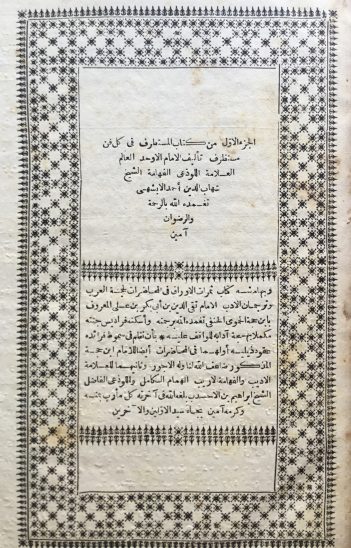Al-Mustatrif fi kul Fann Mustazrif + Kitab Thamarat al-Awraq fi al-Muhadarat. TWO VOLUMES IN ONE. المستطرف في كل فن مستظرف وثمرات الاوراق في المحاضرات
Al-Ibshihi, Shihab al-Din & Taqi al-Din Known as Ibn Hijja al-Hamawi.
Synopsis
Muhammad ibn Ahmad ibn Mansur Baha’ al-Din Abu al-Fath al-Ibshihi was an Egyptian man of letters who was born in 1388 in the Egyptian village of Abshawayh, from which he took his nisba. His fame rests on the reputation of this book, Al-Mustatrif fi Kul Fann Mustazrif (The exquisite in every pleasing art). Al-Ibshihi studied jurisprudence and grammar and memorized the Qur’an at the age of ten. He frequented Cairo where he attended lessons by al-Bulqini. After the death of his father he became a preacher and dedicated himself to literature, which he loved. Al-Sakhawi notes that al-Ibshihi wrote another book on literature, Atwāq al-azhār ‘alá Sudūr al-anhār (Necklaces of flowers on the chests of rivers), and began a book on the art of correspondence entitled Fī Sanat al- Tarassul wa-al-Ktābah (On the trade of correspondence and writing). He might have been the author of a manuscript entitled Tadhkirat al-‘Arifīn wa Tabsirat al- Mustabsirīn (The reminder for the aware and the guidance for the shrewd). Al-Ibshihi writes at the beginning of al-Musta‘rif that he compiled in his book every art in which “striving scholars write volumes”. These arts include aphorisms, literature, histories, anecdotes, information, stories, witticisms and fine poetry. He notes that he took as examples verses from the Qur’an and the authenticated hadith. He wove in fine stories about saints, borrowing material from other books, such as Rabī‘ al-abrār (The spring of the devotees) by al-amakhshari, and al-’Iqd al-Farīd (The unique necklace) by Ibn ‘Abd Rabbih. The book is divided into 84 chapters discussing various topics in religion, morality, nature, poetry and human life in all its aspects. (World Digital Library Catalogue). The second text in these two volumes is by Ibn Hijja (1365-1434), a poet, prose writer and literary critic. He was born and died in the city of Hamah, Syria; he worked in Syria and Egypt as a chancery official. He collected many of his letters in Qahawat al-Insha’. Among his several anthologies of prose and poetry the most famous is this work Thamarat al- Awraq.






